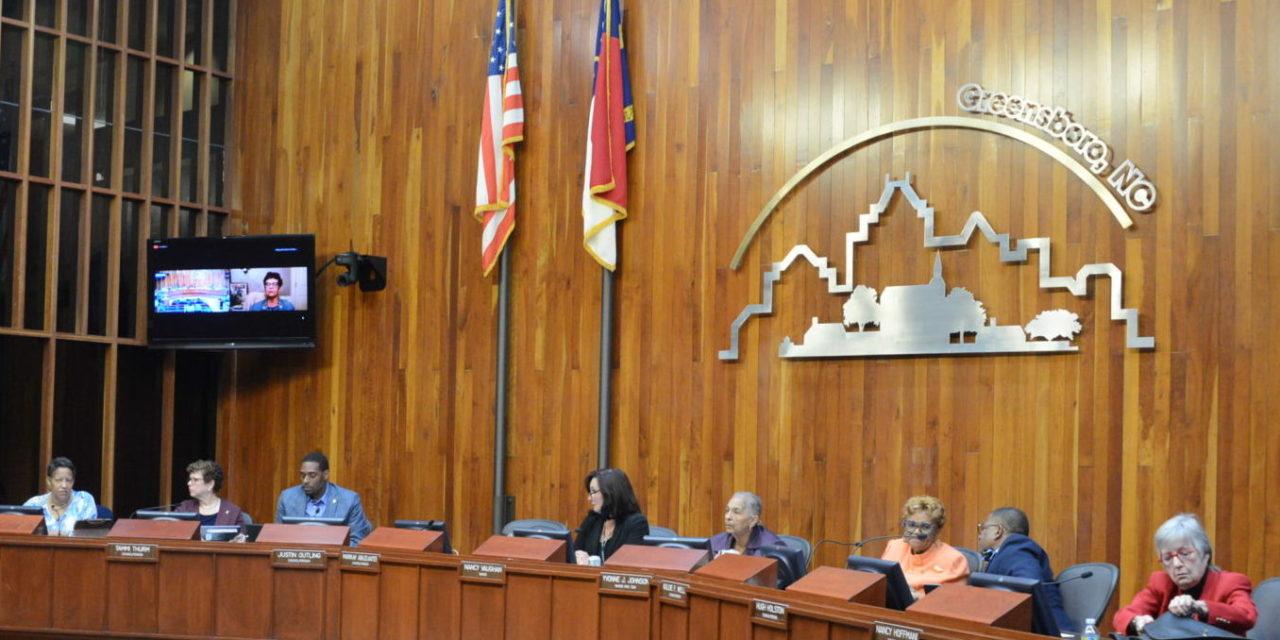After a lengthy, complex, confusing discussion, the City Council passed a resolution outlining a plan for Greensboro to meet the required minimum emergency fund balance in five to seven years at its meeting on Tuesday, May 3.
Exactly what that resolution states is unclear since the resolution passed by the City Council was not published in the agenda, nor was it read at the meeting. City Manager Tai Jaiyeoba reportedly wrote the resolution during a meeting recess and provided city councilmembers with copies. However, the resolution was not read by Mayor Nancy Vaughan and was not displayed on the screen during the meeting, leaving the public in the dark about what exactly the new resolution states.
Councilmembers did discuss some portions of the resolution, revealing some of the language in the new resolution.
The resolution passed by an 8-1 vote with Councilmember Justin Outling voting no.
Outling explained that his no vote was because the resolution included the option of using a tax increase to provide the additional revenue to meet the minimum required emergency fund balance. In fact, according to the discussion, the only source of revenue specified in the resolution was a tax increase. Assistant City Manager Larry Davis in answer to Outling’s question said that without specifying a source of funds, in this case a tax rate increase, that the plan would not meet the requirements for a plan outlined by the North Carolina Local Government Commission (LGC).
Outling said, “This is not voting on a tax increase. But it is voting on a plan and that plan is for a tax increase.”
The LGC recently altered the way the minimum unallocated fund balance also called the emergency fund for municipalities is calculated. The revised LGC requirement is that a city maintain an amount equal to 25 percent of its operating budget in its emergency fund. Greensboro is currently about $9 million below the 25 percent minimum, and in March the LGC gave Greensboro until May 8 to present a plan to the LGC specifying how the city would reach the minimum.
The resolution that was included in the agenda packet states, “Consider a commitment of 0.25 cents or more of the FY 23 tax rate (estimated at $912,500) OR and equivalent amount from other means in order to work toward the 25% goal.”
The main objection from councilmembers to that resolution was that the tax rate increase of 0.25 cents was listed first in the resolution. The revised resolution appears to have moved the proposed tax rate increase to the end of the resolution but does not specify any other source of funding.
Davis repeatedly told the City Council that the LGC had asked for “specificity” in how the $9 million would be raised, but from the discussion it appeared the City Council has no plan on how to raise $9 million other than increasing taxes.
Outling said that the $9 million could be allocated from the $60 million in American Rescue Plan funding that they will receive, instead of a tax increase, but he did not have support for that option from the rest of the City Council.


Clowns.
Take the money you are giving the International Civil Rights Center & Museum (aka the money pit) and use it to offset the difference.
When is an open meeting no longer an open meeting? Mandate Mayor and complicit staff are abusing and disenfranchising us all with shenanigans and deliberately misleading or hiding public business from the public. Elections are way overdue. I hope someone sues the Mayor, city staff, and Lawyers for allowing such callous and repeated abuse of public meetings and missing (or wrong) agenda items.
Vote for Justin Outling for mayor. Nancy Vaughn has been mayor too long. Time for a change.